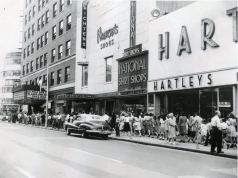The Gay8 Festival recently returned to Calle Ocho after a year of COVID cancellation, spreading its message of diversity and inclusion that co-founder Damian Pardo said is needed now more than ever.
“Politics and political polarization has been probably the most toxic thing that can happen in Miami,” said Pardo of the festival, also known as “Gay Ocho.” “I think the more we learn to put a pause button on the kinds of emotions that are very divisive, the better. And Gay Ocho is supposed to be that pause button also, it’s made to have us refocus.”
The festival was founded in 2015 by Pardo, who works as a financial adviser, and his best friend, documentary director Joe Cardona, after the pair had a conversation over coffee about how segregated Miami is.
“So, they say that we’re like this salad, but we don’t really mix,” Pardo said. “Everybody stays in their little corners.”
Pardo said the point of Gay8 is to bring people together and is kind of like pride on steroids.
“So we’re trying to move away from all the labels,” he said. “That whole thing is just out of control.”
Spanning just over three blocks, the festival offered thousands of participants a chance to explore 79 vendor booths featuring food, art and crafts, as well as numerous social service agencies. Eight stages featured entertainment from the likes of Albita, a Cuban singer and Grammy award winner, fashion shows, drag shows and more.
Gary E. Keating, director of Fort Lauderdale’s Gay Men’s Chorus of South Florida, sang with 25 other members of the group a series of three songs calling attention to the bill recently backed by Gov. Ron DeSantis, dubbed the “Don’t Say Gay” bill.
“I’ve been at this for 36 years and I never thought I had to go back to fight to use the word gay in school or in a public place and if we don’t keep fighting I’m going to lose the right to marry and you are too,” Keating said, before singing with his group the first song called “Seize the Day” from the Broadway musical “Newsies.”
Keating said he’s been performing with the choir in the festival since its inception.
“I mean the very first festival we got here at like 11 o’clock in the morning and we should’ve gotten here at two because nothing really happened,” he says. “At two the street was packed.”
The same was true this year as more and more people started filling the street later on in the day. By the time it hit four o’clock, hundreds of people had gathered in front of another stage to see a drag show hosted by Alexis Fernández, an owner of the gay bar Azucar Nightclub, in his drag character Marytrini.
“I’m very happy because everybody is responding to our call, enjoying our art and all the effort we put in, to the max,” she said.
Marytrini said this is the fifth time she’s performed at the event and she’s happy to be back from the pandemic.
“We’re happy because Gay Ocho is a festival that’s made to integrate the community in order to accept others,” she says. “And this is very important because Miami is a city that keeps on growing and needs to convert into an entertainment capital.”
Marianela Joli, 59, a pageant finalist for Ms.World International and customer service representative for a legal firm, said the festival presents a good opportunity for the area’s economy.
“If they don’t have events like this nothing sells because here we don’t have factories,” said Joli, as she stood backstage waiting to greet a few drag queens. “Here we don’t have industries, we just have beaches as they say, but if they don’t do things like this on the beach then no one comes.”































